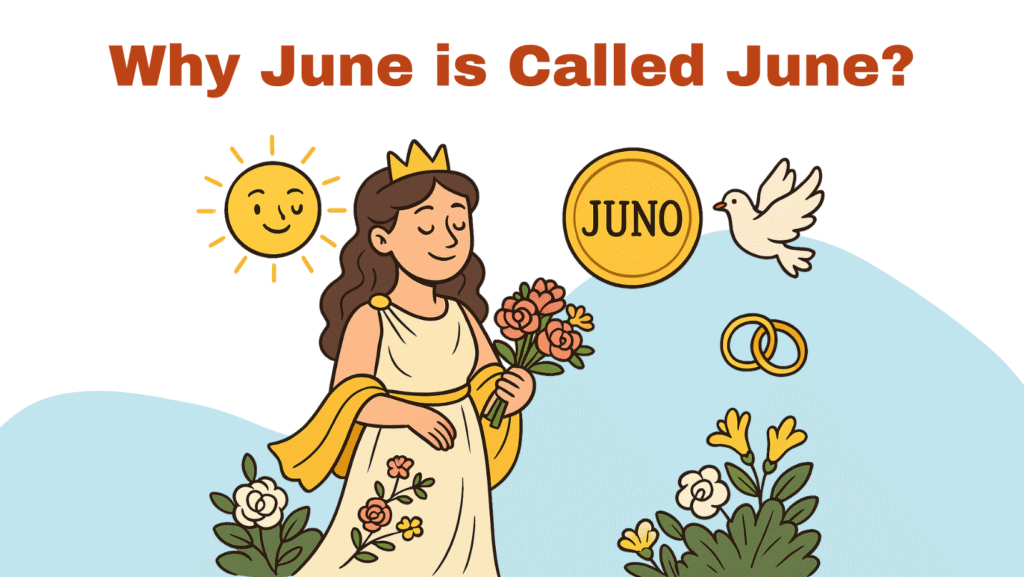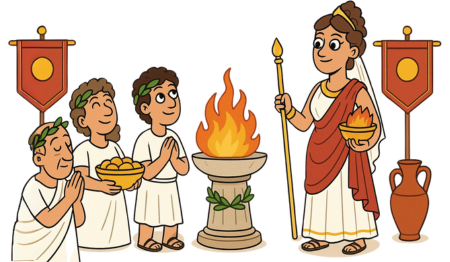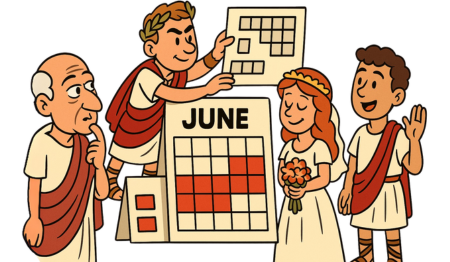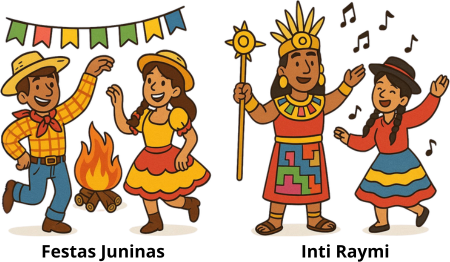
Honoring Marriage in June?
Hold onto your Roman mythology hats — we’re diving into how June got its name. You’ve probably heard that June is named after Juno, the Roman goddess of marriage and childbirth. But what does that actually mean?
Juno was a big deal in ancient Rome. She was called on during marriage ceremonies to bless unions and boost fertility. So, next time you think of June, don’t just picture sunshine and school’s out — picture a divine matchmaker with serious influence.
Ready to go mythological? Let’s break down the history behind this legendary month.

But She Was So Much More
Juno wasn’t just into weddings—she was the queen of the gods. As part of the Capitoline Triad, the Roman power trio (Jupiter, Minerva, and Juno), she helped run the spiritual and political show. Think marriage + military strategy + matriarch energy.
She protected the Roman state, watched over women through every stage of life, and stood at the very top of the Roman religious hierarchy. Basically, she wasn’t sending love letters—she was issuing divine decrees.

Juno’s Ongoing Influence
The Romans didn’t just name a month after Juno for fun—they celebrated her with actual festivals, prayers, and offerings throughout June. She symbolized protection, marriage, and new beginnings. That’s why June became the traditional season for weddings (and still is in many cultures).
The Romans celebrated Juno with various festivals, honoring her influence over this vibrant time of year.

Roman Festivals in June
The Romans didn’t just name June after their main goddess, Juno—they made it a party month. Forget just admiring her in theory—they showed up with rituals, festivals, and offerings to keep the goddesses happy and the vibes divine.
- Matralia (June 11): A festival for married women, honoring Mater Matuta, goddess of dawn and childbirth. Think of it as a sacred shoutout to motherhood.
- Ludi Piscatorii (June 7): A more niche celebration… for fishermen. Yes, even the ancient Roman fish bros got a day.
- Vestalia (June 7–15): Dedicated to Vesta, goddess of the hearth. Women entered her sacred temple barefoot to offer prayers for the home and family.
So yeah, June wasn’t just about sunshine—it was full of fires, fish, and fertility rituals.

A Goddess’s Month
Imagine this: in ancient Rome, June was a time to celebrate Juno’s blessings. The days grew longer, the sun shone brighter, and Romans believed Juno’s presence made this month especially auspicious for marriage and growth. It’s like having a divine cheerleader for all your summer plans!

Why “Marriage” Matters in June?
June is synonymous with weddings, and it’s all thanks to Juno. Her association with marriage made this month a popular choice for couples tying the knot. Think of Juno as the ultimate wedding planner, ensuring that unions formed in her month were blessed with prosperity and happiness.

Visualizing Juno’s Blessings
Picture this: you’re in ancient Rome in June. Flowers are blooming, the air is filled with the scent of fresh growth, and every corner of the city is bustling with preparations for weddings and celebrations. It’s as if Juno herself is walking among the people, blessing each event with her presence.

Greek Connections
Juno wasn’t just a big deal to the Romans. The Greeks knew her as Hera, the wife of Zeus, who shared similar attributes of protecting marriage and women. This cross-cultural reverence highlights the importance of these deities and their influence over the most celebrated times of the year.

Ovid’s Poetic Tribute
The Roman poet Ovid, in his work Fasti, explored multiple theories about June’s origin. He mentioned both Juno, the goddess of marriage, and Juventas, the goddess of youth—as well as a political theory involving young senators (iuniores).
But even while offering different possibilities, Ovid leaned poetic. He painted June as a month of beauty, vitality, and celebration—capturing the essence of life’s milestones, whether weddings or coming-of-age ceremonies.
In other words, he didn’t pick sides. He embraced the full Roman flair for options.

June Wasn’t Always the Sixth Month
Here’s a fun twist: in the early Roman calendar, June was actually the fourth month. The calendar back then started in March, which made way more sense agriculturally.
But then came Numa Pompilius, Rome’s second king, who added January and February to the front of the year. That bumped June down to sixth place, even though it kept its vibe of weddings, transitions, and sunshine.
Later on, Julius Caesar gave the calendar a major glow-up with the Julian reform, locking June in at 30 days—right where it is now.
So yeah, June’s been through some timeline drama.

So… Why Is June Called June?
Whether you side with Juno, the goddess of marriage and state power, or Juventas, the symbol of youth and new beginnings—or you’re just here for the fish festivals—June is layered with meaning.
It’s not just a name on your calendar. It’s a reflection of Roman mythology, politics, poetry, and tradition—all baked into 30 sunny days.
So next time someone says “June,” you can casually ask, “You mean the goddess, the youth movement, or the ancient Roman social calendar?”

A Global Celebration
June’s significance isn’t confined to Rome. Around the world, different cultures celebrate this month in unique ways. In Europe, Midsummer festivals light up the night sky with bonfires and dancing. In Japan, June marks the beginning of the rainy season, which is celebrated with gratitude for the nourishment it brings.

Embracing June’s Spirit
June invites us to embrace life with open arms. It’s a month of growth, celebration, and connection with the world around us. Let the spirit of Juno inspire you to start something new or celebrate a major milestone. Whether it’s planting a garden, getting married, or simply enjoying the warmth of summer, June is a time for vibrant beginnings.

Latin America
In Brazil, June is celebrated with Festas Juninas (June Festivals), which are deeply rooted in rural traditions. These festivals feature folk dances, traditional foods, bonfires, and games.
In Peru, June marks the beginning of winter. It’s a significant month because of the Inti Raymi festival, the ancient Inca Festival of the Sun, which is one of the most important Andean festivals. The celebration includes traditional dances, music, and rituals that honor the sun god, Inti (Sun in Quechua).
Wondering how to say June in other languages? Check out our following section.

🌍 How Do You Say “June” Around the World?
Juno may be Roman royalty, but her name made it onto calendars everywhere. Most modern languages inherited their word for “June” from the Latin Iunius — a subtle tribute to the goddess of marriage and new beginnings.
Whether you’re planning a wedding, booking a summer trip, or just flexing your language skills, here’s how June sounds across the globe:
| 🌐 Language | 📆 Word for June | 🔤 Pronunciation | 🌟 Root or Influence |
|---|---|---|---|
| Spanish | junio | hoo-nyo | Latin Iunius |
| French | juin | zhwã | Latin Iunius |
| Italian | giugno | joo-nyo | Latin Iunius |
| Portuguese | junho | zhoo-nyoo | Latin Iunius |
| Romanian | iunie | yoo-nyeh | Latin Iunius |
| German | Juni | yoo-nee | From Latin via Old High German |
| English | June | joon | Direct from Latin Iunius |
| Mandarin | 六月 (liù yuè) | lyoh-yweh | Literal: “Month Six” |
| Japanese | 6月 (rokugatsu) | roh-koo-gaht-soo | Literal: “Month Six” |
| Quechua | Inti Raymi killa | in-tee ray-mee kee-ya | “Month of the Sun Festival” (regional) |
🌞 Fun fact: While Latin left its mark on most European languages, others like Chinese and Japanese just call it “month six.” And in the Andes, Inti Raymi brings a whole new meaning to June — it’s a time for honoring the sun.
So the next time you write “June” in your planner, remember: you’re echoing ancient Latin — and giving a little nod to Juno herself.

The Origins of Month Names
Curious about the origins of month names? Dive into our blog, “Months & Days”, for an in-depth look at the history behind them. Explore our other sections for fascinating stories and cultural insights into ancient traditions.

Romance in Spanish?
Ready to spice up your Spanish skills? Check out our blog, “Things Spanish People Say in Bed”, for a playful selection of romantic phrases. For even bolder expressions and sensual vocabulary, explore “El Sexi Chupacabras”, where you’ll learn how to say “I love you” and more.

Explore Legendary Tales
Curious about myths and folklore? Visit our “Legends & Folktales” section for stories featuring mythical beings like la Santa Muerte, la Llorona, la Ciguapa, and El Sexi Chupacabras from Hispanic traditions.

Laugh and Learn
If you’re in the mood for humor, we’ve got you covered! While phrases like ‘¡Feliz Año Nuevo!’ or ‘¡Me Gusta la Chucha de tu Madre!’ can be amusing, we always promote respectful language learning. Explore our ‘About’ section to discover our passion for teaching, and don’t miss out on our free lessons at Kasa de Franko.

Discover Kasa De Franko
Curious about Kasa De Franko? At KDF, we offer flexible, enjoyable, and affordable Spanish lessons suitable for all ages. Our polyglot instructor and founder, Franko, is deeply knowledgeable about both language and culture, ensuring a comprehensive learning experience.

Free Spanish Classes!
Ready to Start Your Spanish Journey Today? Visit Kasa de Franko, your cultural and linguistic oasis. Sign up for a free class today and embark on a journey through history, language, and culture. Just hit that red button to get started! And always remember….

